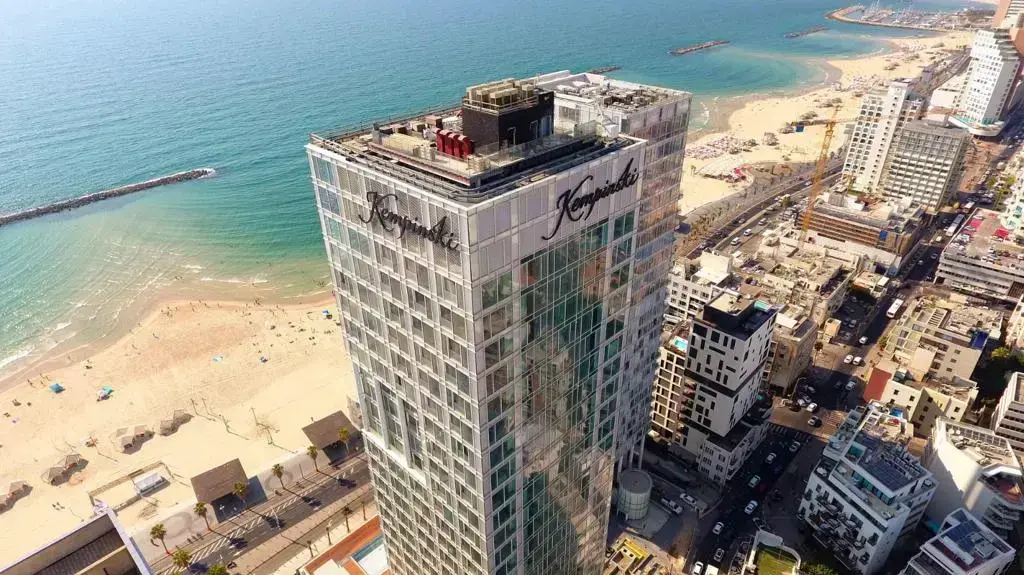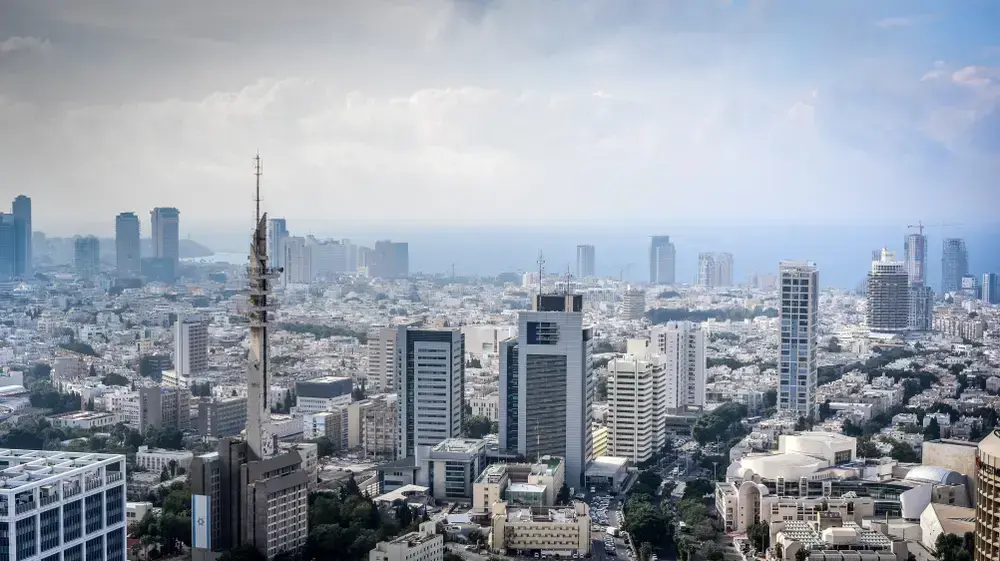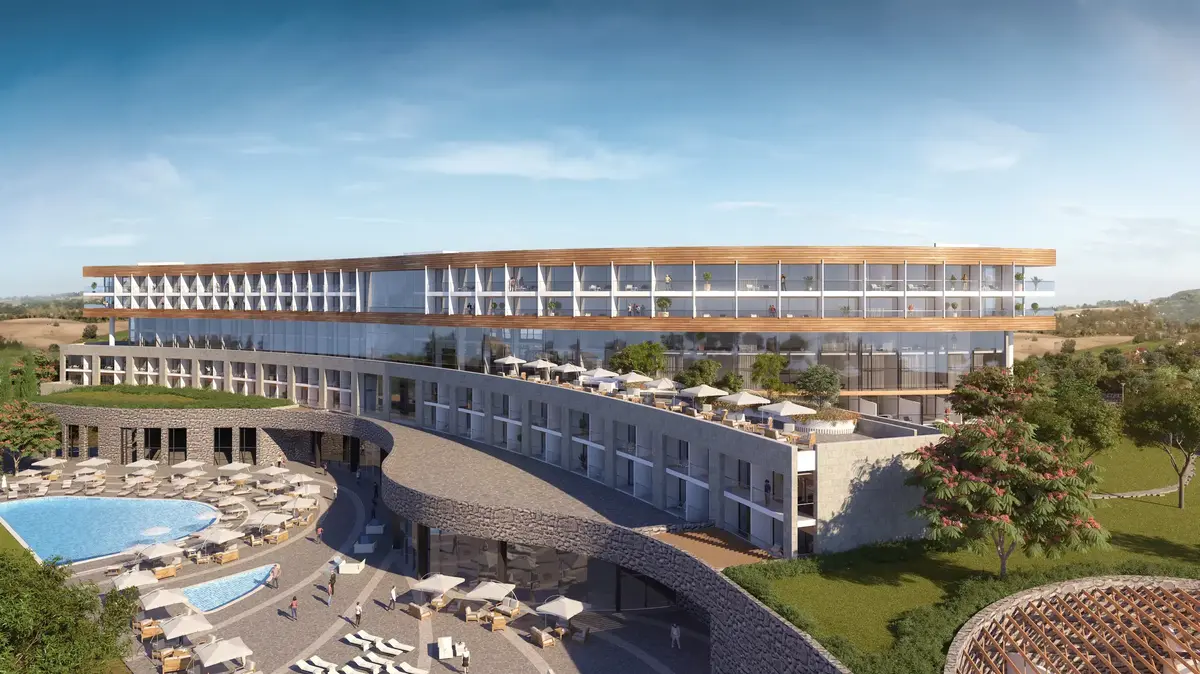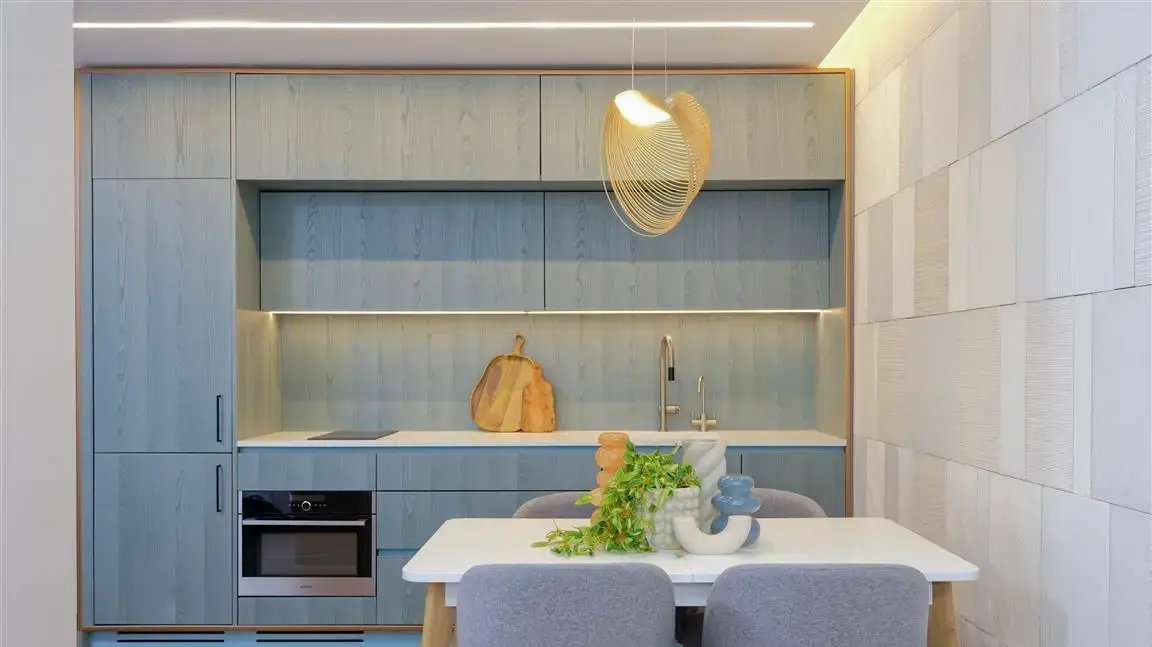NIS 50,000 per suite: The luxurious hotel in Israel concludes its first quarter
Quite a bit was written about the David Kempinski Hotel when it opened: from admiring the luxury to being amazed at the high prices, but only now - from the end of the first quarter of its activity, can we start talking about trends.
We met the CEO, Guy Kliman, to talk about service, recruitment and the commitment to continuous improvement
Ilana Stutland
30/06/2022
Thursday, 30 June 2022, 12:29 Updated: Friday, 01 July 2022, 07:44
Share on Facebook
Share on WhatsApp
Share on Twitter
Share on Email
Share on general
Comments
Comments
Suite at the Kempinski Hotel (Photo: Sivan Esquio)
We go up to the most luxurious suite in the hotel, the Triplex Suite David Penthouse, which is spread over three levels with a total area of 380 square meters. At the beginning of the tour
Guy Kliman, CEO of the new luxury hotel David
Kempinski , Trying to maintain discretion about the price per night.
It further hints that the amount is around NIS 50,000, but each case on its own.
"Some people come on their private planes and pay $ 150,000 just for a New York-Tel Aviv flight, so what's it for them?" He replies when I wonder who the target audience is.
Good to know (promoted)
7 risk factors for heart disease and one way to identify early and prevent heart damage
Served on behalf of Shahal
Guy Kliman, CEO of the David Kempinski Hotel (Photo: PR Kampinski)
80% occupancy
The reservation for this specific suite (which includes a living room, two bedrooms, a private gym, a dining room for 8 diners, two bathrooms, one of which has a dry sauna, an alcohol bar, an 8-meter infinity pool and an elevator between the floors) is made exclusively in front of Kliman himself.
"Think about how long it takes to clean this suite due to its size," he says, emphasizing that "we did not approve bookings for this suite more than we did. Either because of the price, or because of quota of days, or because they wanted to have a party there. "For parties, for all kinds of parties. Since the opening, the suite has been rented for about 40 nights."
The David Kempinski Hotel in Tel Aviv opened on April 12, 2022, two days before Pesach.
It is the 80th hotel in the number of the award-winning hotel chain, which marks its 125th anniversary this year.
The hotel was built over 10 years, it rises to a height of 34 floors and offers 250 rooms (night for a couple per room starting at NIS 1,900, including breakfast), of which 56 suites - 14 of which are considered "very special" and have panoramic sea views.
One of them, for example, is the Royal Suite, which extends over about 150 square meters and includes many indulgences, including a sauna (average cost per night: $ 8,000 plus VAT).
All hotel rooms and suites are decorated in a modern-classic style with huge sliding windows in the center, stretching from floor to ceiling, bringing the sea and natural light into the room, giving a sense of space and flow.
For those who are interested: the pillows in the rooms and suites are made of 100% goose feather made by the German Muhldorfer;
On the lobby floor there is a whiskey bar and a cigar room;
The guests also have access to a luxurious spa with an area of 1,000 square meters;
"Some people come on their private planes and pay $ 150,000 just for a New York-Tel Aviv flight, so what is it for them?" (Photo: Sivan Askio)
Midweek, noon, David Kempinski's lobby is full of guests.
"Today we are at about 80% occupancy. For a two-month-old hotel, which is already reaching such occupations, it is a very big achievement," says Kliman, who has been in the hotel world for 34 years, focusing on international luxury chains.
He was in the Hilton chain for 30 years, launched the Waldorf Astoria Hotel in Jerusalem, CEO Ritz Carlton Herzliya, and recently landed in Kempinski.
In about a week, the Kempinski Hotel Tel Aviv will close its first quarter of activity, and Kliman is pleased. " In the amount of tourists.
If you want to compare, then I know from other colleagues that April this year even surpassed April 2019, "he says." I start with a comparison of zero, but this period from the opening of the hotel in April is a simply unusual period.
The tourism world of luxury hotels in Tel Aviv is flourishing.
You really see that people have held back for a long time. "
-The corona is now raising its head again.
"To be a hotelier in the country you have to be optimistic, not a man of pessimism. You always have to be properly prepared. In the country it is so hard to be a hotelier: there is Operation Peace Galilee and Operation Pillar of Cloud, and there is Corona, there are the stabs, the trampling and the explosions and the shootings. "You always have to be prepared and have a contingency plan for what happens if ... therefore, I also can not live every day the fear of what will happen to the corona."
The tourist mix in Kempinski is diverse.
"There are a lot of Americans who usually come for a longer period than Europeans, for 10 days. Europeans can get to a long weekend or five days," says Kliman.
"We now also have a lot of Australians ahead of the Maccabiah. There has also been a change because of the opening of the line through Dubai, Israel is more accessible to them. The Australians are also coming for a longer period than the Europeans.
We also have Canadian, Russian, Mexican tourists.
One of our biggest markets today is Mexico.
There are also Israeli guests, but they are not the majority.
In hotels in Tel Aviv in general Israelis are not the majority.
We see more couples than families, but families with children also come.
The Jewish market cannot be separated from families.
It's a market that basically travels with children. "-
What is the main challenge for you today?
" The first challenge stems from the fact that there are not enough luxury hotels in the country and then the 'pool' of the people, of the workers, is very limited.
If, for example, you work in London and need to open a hotel, you can always take, or 'steal' people so-called, from other luxury hotels.
Whereas here you need to start and instill your corporate culture right from scratch.
Also, like everyone else today we are faced with a shortage of manpower.
It's a challenge for everyone.
But the more prestigious the hotel, the more people need it, also because the guest pays more, also because of the brand,
In order to maintain the high level, quite a few workers are needed, a problematic interest in today's labor market (Photo: Sivan Askio)
The personal assistant
As mentioned, the main challenge today is to find the right manpower, of a suitable nature for hotels.
"First of all, to work in a hotel you have to love a person," says Kliman.
"If you do not like a person, do not get the satisfaction from it, then it is very difficult to be accepted for the job. It is a very demanding job, 24/7, there are the good moments, the less good and you have to be very flexible in your mental field to fit the hotel world."
-How do you actually deal with the issue of manpower?
"We have new immigrants from different countries, including many workers from Russia who have done it. We also employ workers with disabilities, we have for example 10 deaf people who work in the household. There is also one homeless person we took from the street and started training. He works in the kitchen and now sleeps somewhere neat. "Our agenda is very much to support the community."
At the hotel I meet
Alex Bibas
, 27, originally from Costa Rica, who immigrated to Israel six months ago.
He came to Israel from Spain, where he worked for five years in hotels in international luxury chains.
"I studied hotels in Switzerland, Chicago and Spain," says Bibas.
"I was looking for a challenge in my life, I started looking for work in all sorts of places. I had the option to stay in Madrid and work at one of the luxury chains, but I decided to do it to work at Kempinski."
Today, Bibas is defined as a personal assistant to the guests of the 14 special and prestigious suites in the hotel, and is also responsible for the customer experience.
"I take care of everything the suite guests need," he says.
"Before the guests arrive, I ask them all sorts of questions about preferences, do they have allergies, is there anything specific I need to know or do before arriving. It could be even a simple thing like extra pillows in the room. There were no complicated requirements yet. Someone just "He asked for a Pesach Seder in the room, or a helicopter flight to Caesarea. Everything they want and need and it's legal - I will do."
- What is your job satisfaction?
"First of all, here in this hotel it's like the United Nations. There are workers from every country you can think of: Ukraine, Russia, Moldova, Argentina, France and more. I'm alone here in the country and they are like my family. Also, hotels are my passion, it's What I learned, is what I like to do. I like to meet people, different cultures, different backgrounds, and also every day is a different job. It is not an office job that every day is the same. The hotel has different guests, so the experiences change all the time. Not a routine. "
"Currently," says CEO Kliman, "we have between 280-300 employees. 40 are missing. Our situation is relatively good in that we are really doing a lot of activities to get employees. We have been to all kinds of 50-plus associations and we have done recruitment campaigns. There are. We have a lot of people over the age of 60 and 70 who work in all kinds of positions, whether it is a shift manager or a doorman. We also do a lot of activities with new immigrants. We have new immigrants from 18 countries. We have become a kind of international group like this. High-tech, and we give excellent and excellent conditions to our employees. "
-Like what, for example?
"The employee who earns the lowest with us earns 30% above the minimum wage. Employees have yoga, Pilates, extreme sports once a week. They have a dining room that does not embarrass any high-tech dining room. The turnover in the hotel world is great. Therefore it is very important for us to retain employees. And make sure they are satisfied. In the hotel world the employee should be satisfied, because the guest feels it. The employees we hired underwent two months of training by people who came from abroad from the network.
The biggest feedback we get from guests is about the mix of employees, the service. "Relevant to Tel Aviv: You see Tel Aviv. We gave a lot of space to the large windows, to the view. The guest feels Tel Aviv, on the one hand the beach, on the other hand the urbanity."
Alex Bibas, "Butler" at the Kempinski Hotel (Photo: Sivan Askio)
Respect for competitors
Kliman, who these days spends most of his day at the hotel, sees importance in the small details.
On a tour of one of the suites, for example, he stops for a moment and photographs a small crease in one of the sheets.
"I get up every morning to improve things. Obviously there is something to improve, especially in the opening," he says.
"It takes a long time until you reach the bottom line that you are happy with, and from which you have to constantly improve. Also, what is very important is to produce a model that the guests want. I always say to my chef: 'Cook what the guests want to eat and not what you like. "We see reactions, we change, we do not settle on a certain thing. We are very flexible and want to see that what we thought was right - is really true and relevant."
Kliman adds that "the more international chains come to Tel Aviv, the higher the level of service and the city will receive a better tourist stamp in the world. There is no hotel culture in Israel. Abroad there are academies, there are places where you study hotels, combine work with studies in the field.
Whereas here in Israel this hotel is a casual job, not a permanent job like in Italy for example. " - Do you
feel competition with the luxury hotels in the area?
" I always respect the competitors, and there are competitors.
There is the Hilton which is very dominant, there is the Hotel 'De Jaffa', the 'The Norman', the 'Stay'.
You need to respect and recognize your competitors.
It is very important".
Of money
Tags
Hotels
suite
Tel Aviv Jaffa









